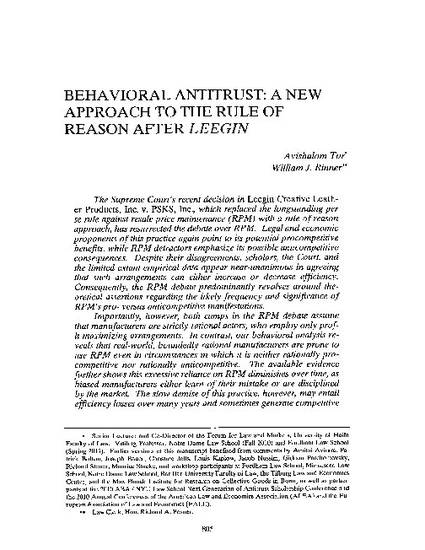
The Supreme Court’s recent decision in Leegin Creative Leather Products, Inc. v. PSKS, Inc., which replaced the longstanding per-se rule against resale price maintenance (RPM) with a rule of reason approach, has resurrected the debate over RPM. Legal and economic proponents of this practice again point to its potential procompetitive benefits, while RPM detractors emphasize its possible anticompetitive consequences. Despite their disagreements regarding the overall RPM evaluation, however, scholars, the Court, and the limited empirical data appear near-unanimous in agreeing that such arrangements can either increase or decrease efficiency. Consequently, the RPM debate predominantly revolves around theoretical assertions regarding the likely frequency and significance of RPM's pro- versus anti-competitive manifestations. Importantly, however, all of these theories also assume – like traditional antitrust scholarship more generally – that manufacturers are strictly rational actors, who employ only profit-maximizing arrangements.
In contrast, a behavioral analysis suggests that real-world, boundedly-rational manufacturers are prone to overuse RPM, at times harming consumers. The available evidence reveals this excessive reliance on RPM slowly diminishes over time, as biased manufacturers are taught or disciplined by the market. The slow demise of this practice, however, may entail significant efficiency losses over many years. Yet because RPM will sometimes be procompetitive, Leegin's rejection of its per-se condemnation in favor of a rule of reason analysis is still justified. The present analysis therefore not only offers a novel account of resale price maintenance, but also shows how boundedly rational RPM challenges the various post-Leegin approaches developed by some courts, enforcement agencies, and scholars on both sides of the RPM debate. We close by outlining our alternative, behaviorally informed, structured rule of reason inquiry for this restraint.
Available at: http://works.bepress.com/avishalom_tor/2/

Reprinted with permission of the University of Illinois Law Review.